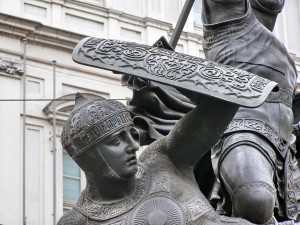 If there’s one area in which we in the Lord’s church excel, it’s knowing our Bibles. Most of us can rattle off the plan of salvation, complete with book, chapter, and verse, quick enough to stop a denominational door-knocker in their tracks. When it comes to matters of doctrine, most of us tend to be pretty confident, and with good reason. However, I’d like to suggest that we (okay, I) have a significantly harder time knowing what to say to people with no religious background whatsoever.
If there’s one area in which we in the Lord’s church excel, it’s knowing our Bibles. Most of us can rattle off the plan of salvation, complete with book, chapter, and verse, quick enough to stop a denominational door-knocker in their tracks. When it comes to matters of doctrine, most of us tend to be pretty confident, and with good reason. However, I’d like to suggest that we (okay, I) have a significantly harder time knowing what to say to people with no religious background whatsoever.
How do you convince someone with no faith at all that there is a God? Even if they believe in a higher power, how do you convince them of its will? You can point to Bible verses all day long, but it won’t do you any good– they’ll want concrete proof, and for the most part, they don’t care what your Book has to say. They probably don’t believe a word of it.
Luckily for us, God didn’t leave us in the dust. He wants us to put our faith in Him, but He doesn’t expect us to blindly follow Him. Through His words He has provided instruction as to how we live our lives, but He has also offered proof that these words are true– proof that can be essential in order to convince some of the existence of God and his power. So that’s what we are going to look at today. 🙂
Switching gears, do me a favor and go ahead and read Ezekiel 26:1-16. (No, seriously. Do it. Thanks.)
As you just read, this prophecy is about the future fall of Tyre, a Phoenician city, and it has several different parts. I’ll line them up as they were fulfilled so it will make more sense when we get there:
1. Nebuchadnezzar would be the one to conquer Tyre (7).
2. Many nations would rise against Tyre (3).
3. It would be scraped to the bedrock (4).
4. Stones, timber, and debris would be thrown in the water nearby (14).
5. The “princes of the sea” would “clothe themselves with trembling” at Tyre’s fate (16).
6. The city of Tyre would never be rebuilt (14).
7. It would become a place for the spreading of nets (5).
 That’s what the Bible has to say about Tyre; it never mentions whether or not the prophecy was fulfilled. However, history shows us that indeed it was.
That’s what the Bible has to say about Tyre; it never mentions whether or not the prophecy was fulfilled. However, history shows us that indeed it was.
1. In 573 BC, roughly twenty years after this prophecy was written, Nebuchadnezzar king of Babylon invaded and conquered the city of Tyre. As a result, its Phoenician inhabitants fled to a nearby island.
2. In 332 BC, more than two hundred years after this prophecy was written, Alexander the Great, along with his many allies, attacked.
3. Since the Phoenicians had moved to the island, Alexander had to build a causeway to reach them. To do so, he scraped the debris from the abandoned city of Tyre down to the bedrock…
4. … and threw it into the sea, building a bridge so that he could attack the people.
5. So great was the desolation in Tyre that other seaside nations are reported to have opened their gates to Alexander without a fight, hoping to avoid such massive destruction.
6. Despite its convenient location close to the sea, the city has never been rebuilt, even in modern times.
7. However, the still barren bedrock where the original city of Tyre rested has become a popular fishing spot, and old fishermen still cast their nets there today.
Perhaps the fulfillment of one or even two parts of the prophecy could be chalked up to coincidence, but all seven? Not a chance!! Plus, if you were going to make a wild guess and hope it came true, would you be so incredibly specific as Ezekiel in this prophecy? Of course not! You’d keep it vague and open for interpretation.
Let me reiterate that God in His Word never tells us how this prophecy ends. All the events I just mentioned are historical fact, known from other sources. What’s more, this is only one of literally hundreds of fulfilled prophecies in the Bible. God does not expect us (or anyone else) to “take His word for it” on the truth of the Scriptures. Even if He isn’t going to come down from Heaven and appear to us today, He offers us far more than enough proof of the accuracy of His words, in prophecy alone. Believing in Him becomes the logical choice.
“Now faith is the assurance of things hoped for, the conviction of things not seen.” — Hebrews 11:1
By Melissa Hite
Melissa is a freshman at Harding. Her goals include continually growing closer to God and eventually becoming a writer and a mom. On her blog, Christ Crossed My Heart, you can find other poignant, well-written posts.
 Welcome! We are so glad you stopped by. Come Fill Your Cup is a group of Christian ladies dedicated to equipping women for study and service. We know you are busy and that life’s hectic pace pulls you in so many directions, but you can’t truly be the woman God desires unless you take time to fill your own cup…not with spa days (though we love a good spa!) or the latest novel…but with God’s Holy Word. We want to help you with that! Our goal is to reach you in the midst of your busy day and give you encouragement, education, and fellowship as you strive to live the life God has laid before you. Our prayer is that we can help fill your cup so that you, in turn, can overflow to all those around you. So, as we like to say…come fill your cup, and let it overflow!
Welcome! We are so glad you stopped by. Come Fill Your Cup is a group of Christian ladies dedicated to equipping women for study and service. We know you are busy and that life’s hectic pace pulls you in so many directions, but you can’t truly be the woman God desires unless you take time to fill your own cup…not with spa days (though we love a good spa!) or the latest novel…but with God’s Holy Word. We want to help you with that! Our goal is to reach you in the midst of your busy day and give you encouragement, education, and fellowship as you strive to live the life God has laid before you. Our prayer is that we can help fill your cup so that you, in turn, can overflow to all those around you. So, as we like to say…come fill your cup, and let it overflow!
Excellent article sister, keep up the amazing God work!!
Thanks so much Melissa!!! Great job!!! Love ya!!!
Great article. We were just talking to a friend of ours about this type of thing last night. Looking forward to sharing!